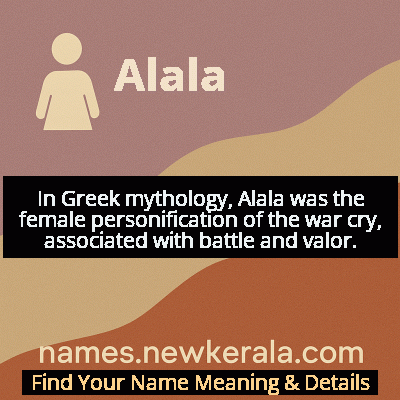Alala Name Meaning & Details
Origin, Popularity, Numerology Analysis & Name Meaning of Alala
Discover the origin, meaning, and cultural significance of the name ALALA. Delve into its historical roots and explore the lasting impact it has had on communities and traditions.
Name
Alala
Gender
Female
Origin
Greek
Lucky Number
9
Meaning of the Name - Alala
In Greek mythology, Alala was the female personification of the war cry, associated with battle and valor.
Alala - Complete Numerology Analysis
Your Numerology Number
Based on Pythagorean Numerology System
Ruling Planet
Mars
Positive Nature
Generous, passionate, energetic, and humanitarian.
Negative Traits
Impulsive, impatient, moody, and can be overly emotional.
Lucky Colours
Red, maroon, scarlet.
Lucky Days
Tuesday.
Lucky Stones
Red coral, garnet.
Harmony Numbers
1, 2, 3, 6.
Best Suited Professions
Military, sports, philanthropy, leadership roles.
What People Like About You
Courage, energy, leadership, generosity.
Famous People Named Alala
Alala (Mythological)
Divine Personification
Sister and companion of Ares, god of war; embodiment of the battle cry
Alala Band
Musical Group
Hawaiian music preservation and modernization
Alala (Literary Character)
Fictional Character
Inspiration for strong female warriors in modern fantasy literature
Name Variations & International Equivalents
Click on blue names to explore their detailed meanings. Gray names with will be available soon.
Cultural & Historical Significance
Extended Personality Analysis
People named Alala typically exhibit a remarkable combination of strength and expressiveness that reflects their mythological origins. They are often natural communicators who aren't afraid to voice their opinions or stand up for others. This vocal confidence frequently makes them effective leaders and advocates, capable of inspiring those around them through both words and actions. Their personality often includes a strong sense of justice and protection, mirroring the defensive nature of the original war cry. While they can be intense and passionate, this usually manifests as dedication rather than aggression. They tend to be highly resilient individuals who approach challenges with strategic thinking and determination. In social settings, Alalas often become the voice of their group, whether in professional environments advocating for team interests or in personal relationships ensuring everyone's voice is heard. Their strength is typically balanced with emotional intelligence, allowing them to read situations accurately and respond appropriately. This combination of courage, communication skills, and protective instincts makes them valued friends, partners, and colleagues who bring both passion and purpose to their endeavors.
Modern Usage & Popularity
In contemporary naming practices, Alala occupies a unique space as a mythological name that combines ancient significance with modern appeal. While still quite rare, the name has gained traction among parents seeking distinctive names with strong female associations. Its usage is particularly notable in academic communities, creative fields, and among families with Greek heritage or classical interests. The name's popularity has seen gradual growth since the early 2000s, coinciding with increased public interest in Greek mythology through popular books, films, and television series. In the United States, the name remains outside the top 1000 but appears more frequently in states with larger Greek-American populations. Social media has also played a role in the name's modern rediscovery, with parents sharing their choice of this powerful mythological name. The name's appeal lies in its combination of uniqueness, strong feminine energy, and rich historical background, making it an attractive option for parents looking beyond traditional naming conventions while maintaining classical roots. Its relative rarity ensures that children named Alala will have a distinctive identity while carrying a name with profound historical and symbolic weight.
Symbolic & Spiritual Meanings
The symbolic meanings of Alala extend far beyond its literal translation as a war cry, representing profound concepts of voice, courage, and transformation. Symbolically, the name embodies the moment of finding one's authentic voice and using it with power and purpose. It represents the courage to speak difficult truths and the strength to advocate for oneself and others. In psychological terms, Alala symbolizes the internal battle cry that helps individuals overcome fear, self-doubt, and external obstacles. The name carries strong associations with protection and defense, reflecting how the original war cry was meant to safeguard warriors and their communities. Metaphorically, Alala represents the power of collective voice and community action—the idea that individual voices united can create significant change. The rhythmic, chanting quality of the name itself suggests harmony and coordination, symbolizing how effective communication and synchronized effort can achieve remarkable results. In modern spiritual contexts, the name has come to represent personal empowerment, particularly for women finding their voice in traditionally male-dominated spaces. It's a name that encourages its bearers to be heard, to stand up for their beliefs, and to use their voice as an instrument of positive change and personal strength.

